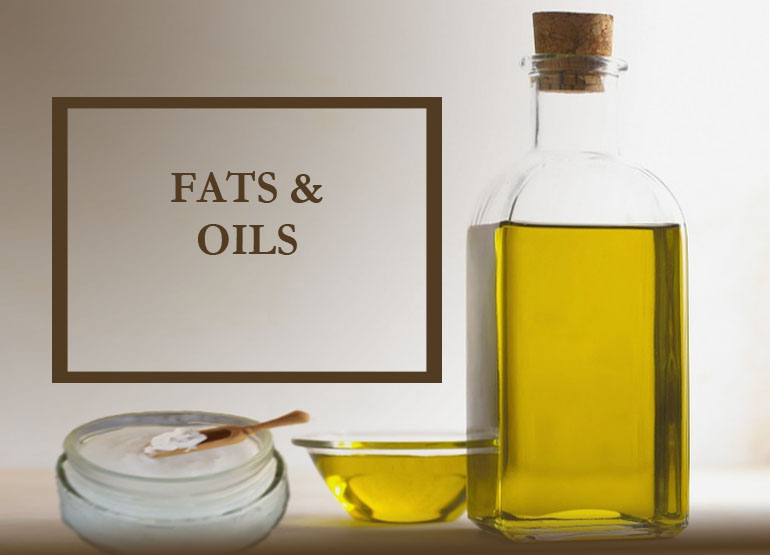Health Pages
About Fats & Oils
About Fats & Oils
Fats are important foodstaf for many forms of life and belong to a group od substances called lipids. Lipids are biological chemicals that are soluble in organic solvents and insoluble in water. Fats are one of the three main macronutrients (along with carbohydrates and proteins), required to produce energy, repair damaged tissue, promote tissue growth, and regulate physiological processes. Fats are a necessary part of the diet of most heterotrophs, including humans, and they are found in virtually all foods. The main difference between fats and oils is that fats are solid at room temperature, while oils are liquid.
Fats serve both as energy sources for the body, and as stores for energy in excess of what the body needs immediately. Fats carry the fat-soluble vitamins A, D, E, and K; they can only be digested, absorbed, and transported in conjunction with fats. Without fat these vitamins would quickly pass through the body. Fats and other lipids are broken down in the body by enzymes called lipase produced in the pancreas.
Fats and oils are made up of basic units called fatty acids. All fats and oils are a mixture of saturated fatty acids and unsaturated fatty acids. Unsaturated fatty acids include monounsaturated and polyunsaturated fats. Fats and oils are categorized according to the number and bonding of the carbon atoms in the aliphatic chain. Fats that are saturated fats have no double bonds between the carbons in the chain. Unsaturated fats have one or more double bonded carbons in the chain. Within these categories, some specific fatty acids promote good health while others do not.
Some fatty acids that are set free by the digestion of fats are called essential because they cannot be synthesized in the body from simpler constituents. There are two essential fatty acids (EFAs) in human nutrition:
 Alpha-linolenic acid (an omega-3 fatty acid) and
Alpha-linolenic acid (an omega-3 fatty acid) and
 Linoleic acid (an omega-6 fatty acid)
Linoleic acid (an omega-6 fatty acid)
Other lipids needed by the body can be synthesized from these and other fats.
Fats are important nutrient in our diets. They provide a concentrated form of energy we need (9 calories per gram). They play a vital role in maintaining healthy skin and hair, maintaining body temperature, insulating body organs against shock, and promoting healthy cell function. Fat also serves as a useful buffer against a host of diseases. When a particular substance, whether chemical or biotic, reaches unsafe levels in the bloodstream, the body can effectively dilute (or at least maintain equilibrium of) the offending substances by storing it in new fat tissue. This helps to protect vital organs, until such time as the offending substances can be metabolized or removed from the body by such means as excretion, urination, accidental or intentional bloodletting, sebum excretion, and hair growth.
Related links and recommended readings:
- Saturated Fats
- Unsaturated Fats
- Trans Fat
- Fats and Oils
- Low Fat Diet
- Learn More About Cholesterol & Fats
- Fat Facts
- Fat Scoreboard
- Test Your Fat I.Q.
- Diet and Eating Out
- Cholesterol and You
- Cholesterol Content of Commonly Used Food
- Evaluating the Association of Saturated Fat with Cardiovascular Disease.
- The Truth About High Fat Diets
- Big Fat Myths
- A Refresher on Fats
- Hydrogenated Fat Dangers



